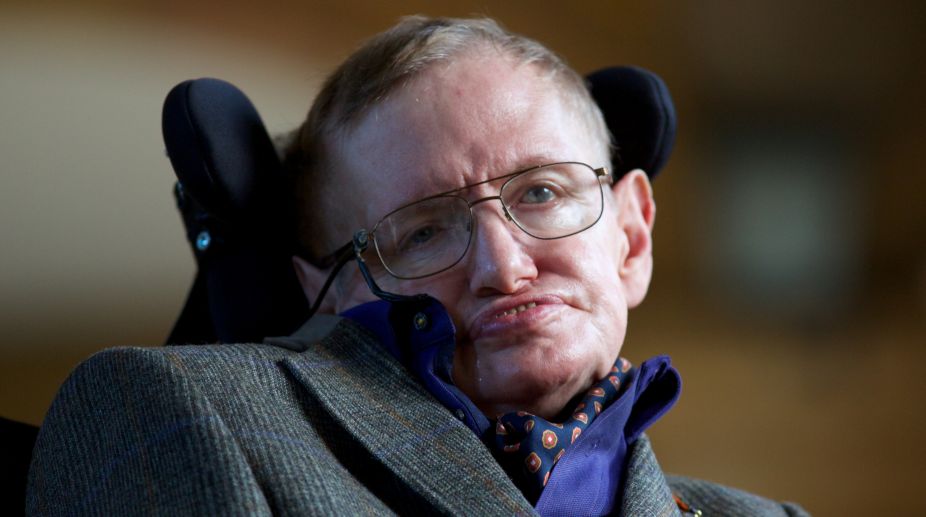Stephen Hawking: There is no God. No one directs the universe
"There is no God. No one directs the universe," says celebrated physicist Stephen Hawking in his final book "Brief Answers to the Big Questions."
Best-known for his work on black holes, the theoretical physicist wrote international bestseller A Brief History of Time

Stephen Hawking. (Photo: AFP)
Professor Stephen Hawking, one of the most renowned scientists of all time, died at his home at the age of 76, his family told the UK media.
In a statement, Professor Hawking’s children, Lucy, Robert and Tim said: “We are deeply saddened that our beloved father passed away today. He was a great scientist and an extraordinary man whose work and legacy will live on for many years. His courage and persistence with his brilliance and humour inspired people across the world. He once said, ‘It would not be much of a universe if it wasn’t home to the people you love.’ We will miss him forever.”
Advertisement
Professor Hawking suffered from a rare early-onset slow-progressing form of amyotrophic lateral sclerosis (ALS), also known as motor neurone disease or Lou Gehrig’s disease, a disability that gradually paralysed him over time.
Advertisement
The late theoretical physicist and cosmologist scientist was best known for his work on black holes. His theory dispelled the belief that black holes were inescapable for all forms of matter and energy. He theorised that black holes emit blackbody radiation, now known as Hawking radiation, due to quantum effects near the event horizon.
Hawking turned 76 on January 8 this year.
Hawking contracted motor neurone disease in 1963 and was given two years to live but he went on to study at Cambridge and became one of the most brilliant theoretical physicists since Albert Einstein.
For the most part of his life, the physicist used a wheelchair to move around and a speech synthesiser that allowed him to speak in a computerised voice with an American accent.
For Hawking, the early diagnosis of his terminal disease ignited a fresh sense of purpose.
“Although there was a cloud hanging over my future, I found, to my surprise, that I was enjoying life in the present more than before. I began to make progress with my research,” he once said. “My goal is simple. It is a complete understanding of the universe, why it is as it is and why it exists at all.”
Hawking’s first major breakthrough came in 1970, when he and Roger Penrose applied the mathematics of black holes to the entire universe and showed that a singularity, a region of infinite curvature in spacetime, lay in our distant past: the point from which came the big bang.
In 1982, Hawking was among the first to show how quantum fluctuations tiny variations in the distribution of matter might give rise through inflation to the spread of galaxies in the universe.
But it was A Brief History of Time that rocketed Hawking to stardom. Published for the first time in 1988, the title made the Guinness Book of Records after it stayed on the Sunday Times bestsellers list for an unprecedented 237 weeks. It sold 10 million copies and was translated into 40 different languages.
Hawking won the Albert Einstein Award, the Wolf Prize, the Copley Medal, and the Fundamental Physics Prize. The Nobel prize, however, eluded him.
Stephen Hawking’s life inspired a lot of filmmakers to work on him. While a number of films have been made on the genius, The Theory of Everything (2014) remains the most popular one. The biographical romantic drama set at Cambridge University detailed the life of Hawking. It was directed by James Marsh, and adapted from the memoir Travelling to Infinity: My Life with Stephen by Jane Hawking, which deals with her relationship with her ex-husband, his diagnosis of ALS, and his success in physics.
The film stars Eddie Redmayne and Felicity Jones as the Hawking couple Stephen and Jane. The role won Eddie Redmayne the Academy Award and the Golden Globe Award for Best Actor and Screen Actors Guild Award for Outstanding Performance by a Male Actor in a Leading Role.
Hawking (2013), a documentary film, was another reel work that had Hawking himself describing his life from childhood, his struggle with ALS and his recognition as a world-famous scientist.
This BBC too made a television film, Hawking, in 2004, which was about Stephen’s early years as a PhD student at Cambridge University. Benedict Cumberbatch played Hawking in the show.
A Brief History of Time (1991), directed by Errol Morris, was a biographical documentary film that featured interviews with Hawking’s family members, colleagues, and even his childhood nanny.
Another documentary, Beyond the Horizon (2009), has a reporter, who wants to write a feature story about cosmology, interview Hawking.
(With agencies)
Advertisement